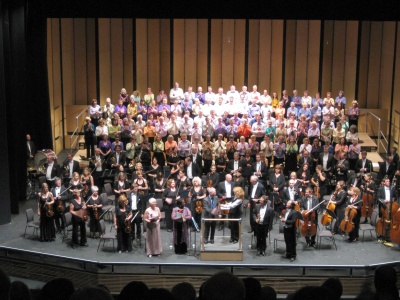I'm a townie, or at least a suburbanite. I've lived most of my life in (often on the edge of) cities and large towns. I've never had an urge to live in the countryside or a village. Countryside for me means mountains and big lakes, not low rolling hills and thatched cottages.
Moreover, I've never much liked pastoral music (apart from Beethoven's 6th Symphony and even that is far from my favourite of his symphonies). The continued popularity of Vaughan Williams' The Lark Ascending, long topping the Classic FM annual listeners' poll, has always baffled me.
 However, I've been powerfully affected by the pastoral sentiments of Frostiana, Randall Thompson's setting of seven poems by Robert Frost. The OU Choir, of which I'm a member, performed the suite today, and I've got a lot out of learning the piece. Our conductor, Bill Strang, talked us (and the audience) through the subtle history of the poetry and the music.
However, I've been powerfully affected by the pastoral sentiments of Frostiana, Randall Thompson's setting of seven poems by Robert Frost. The OU Choir, of which I'm a member, performed the suite today, and I've got a lot out of learning the piece. Our conductor, Bill Strang, talked us (and the audience) through the subtle history of the poetry and the music.
The poems are very much pastoral in theme, and the musical setting fits it. They talk of woods, farms, flowers, paths, pastures, cows, stars and villages. They're small scale pieces, local in intent. Many almost feel impressionist: they capture a moment in time and display the scene in detail. Only in a few places do they explicitly address big themes.
The big themes are most prominent at the start and the end of the piece, with settings of the poems "The Road Not Taken" (Frost's famous poem about decisions, of roads diverging in a wood) and "Choose Something Like a Star" (the most abstract piece, about the voice of a star). The latter seemed very appropriate to sing the day after the first human spacecraft had landed on a comet (including several OU scientists). These themes are strong and clear ones, although The Road Not Taken is often misunderstood. There are subtler themes in the five poems in between, and many layers to each of them.
But the overwhelming feel of the piece for me is its pastoral sensitivity. The countryside in question is that of New England - Frost and Thompson both lived much of their lives in New England and were both associated with the town of Amherst, Massachusetts, for whose 200th anniversary the piece was written. And yet it's really striking that several of the poems were written in (old) England, when Frost was seeking to establish himself as a poet (and under the influence of the English writer Edward Thomas with whom Frost formed a close friendship); and that Thompson wrote most of the music while living in Switzerland. So the pastoral scenes are wider than they first appear.
I can't say that Frostiana has made me want to move to the countryside, certainly not around Milton Keynes or Northampton. But it has certainly given me a more sympathetic sense of the value of pastoral life.



No comments:
Post a Comment